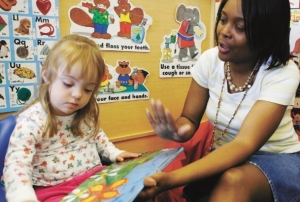A calling to care
By Phyllis Moore
Published in News on April 6, 2009 1:46 PM

News-Argus/GREG SOUSA
Edgewood student Mary Gray, 3, reads with instructional assistant Jennifer Moore.

News-Argus/GREG SOUSA
Edgewood student Connor Pitts, 4, plays with a toy piano during "center time" in Jackie Joseph's morning preschool class.
For passers-by on Peachtree Street, the brick building looks like any other school in Wayne County.
But behind its walls, Edgewood Community Developmental School is meeting the needs of a special population -- developmentally delayed students ages 3 to 22.
For more than three decades, Edgewood has served not only residents of Wayne County, but families from across the state. Many an Air Force family has requested to be stationed at Seymour Johnson Air Force Base because of the access to the specialized education for children offered by the school.
Current enrollment is 173, with a staff of 107 because of the need for full-time services -- including physical therapy, occupational therapy and speech language, plus a full-time school nurse.
Principal Tasha Adams, a former special education teacher herself, said her staff is unbelievably dedicated, from classroom teachers to cafeteria workers.
School nurse Angie Dunn has been at Edgewood for four years. Her duties include responding to emergencies and performing tube feedings to making daily rounds to classrooms.
"These children can't come to the school nurse's office like the other schools, so I go to them. The staff is wonderful because they know their children so well that they pick up on little subtle changes," she said.
Not everyone realizes the uniqueness of the school.
"A lot of people assume that we may be a day facility or a residential facility where we keep children overnight," Mrs. Adams said. "We have students with mild, moderate and severe profound disabilities. We have a lot of students that can independently walk, talk, lift their hands -- they're mobile."
It's a school where every teacher is a "special educator," Mrs. Adams said.
Mrs. Adams became principal at Edgewood in 2004. Her work is her passion, she said, but she said she is not alone.
"Everyone who is here is here because they want to be here," she said.
And at a time when there is a teacher shortage, especially in the area of special education, Edgewood is an exception.
High school teacher Cindy Sprouse began working at Edgewood 12 years ago. It's where she found her niche, she said.
"I started out in other counties teaching special ed, and as areas were identified and titles were changed, I was trying to find where I best fit," she said. "My first love was working with home-based students and students on the lower end of the cognitive spectrum. ... I was looking for something different where students are doing more (and) they get to go home. I came here, it was like going from preschool to kids being in college because the kids get to do so much more."
Elementary teacher Barbara Wagner has been at the school for 21 years, having previously been a program administrator in another state.
"One of the things I realized was the difficulty in being able to retain teachers in schools. I learned over the years that the longer you can retain teachers in a program, the better the quality of the program," she said. "I have had the opportunity to really see staff retention because every teacher understands what each other is going through."
It's unusual to see staff turnover at Edgewood, she noted. Perhaps because teachers support one another and rely on their counterparts to gain insights into reaching students who are otherwise challenging.
"I think the key to being a successful teacher here at Edgewood is seeing the potential for what the kids are doing," she said. "You have to get past what they can't do and where those high expectations are going to be set and assist not only your staff in the classroom but help those kids meet the expectations."
Jackie Joseph, a preschool teacher, who has been at Edgewood for 33 years, said all members of the staff understand they are working toward the same goal.
"You have phenomenal help here to assist you to take care of the child at their optimal level. When you concentrate on that, it's not so difficult. Now, is it always easy? No. But I think everybody here works together," she said.
She said her job is not work, it's a calling.
Ms. Wagner agreed.
"I think there's a calling for this. It's not work. It's a mission. You're sent, you're called. I think when you get in positions like Jackie and myself as far as longevity goes, you begin to look at the calling as not only for your present students, it's your legacy that you begin to work on. It's important to pass that on, not only to the staff but also to the parents."
Parents are a key part of the relationship equation, the staff said.
"We make it a point to make our families feel that they can come to us and talk to us. We become a part of their family," said Judith Isom, a preschool instructional assistant who has been at the school for 25 years. "We work really well together and have good relationships with our parents. They feel very comfortable coming to us, and sometimes we educate them."
The school has also reaped dividends from such relationships. When students transition to other schools, for instance.
"I think it says a lot for Edgewood. We have had children come through and go on to another school, and parents still come to our school and volunteer," said Monica Tobe, a preschool teacher at Edgewood since 2005.
Parents and grandparents will also come out and observe, Ms. Dunn said, sometimes just "to see how we handle the child so they can get the child to behave better at home."
Melissa Carrasquillo, a lateral entry elementary teacher at the school for more than three years, appreciates the support that comes from parents and staff working together.
"A lot of people have the misperception that we're over here baby-sitting," she said. "Whereas teachers do their lesson plans, we have to modify our lesson plans seven, eight, nine different ways. ... Just having the resources we have here -- the occupational therapy, physical therapy, speech -- it's just incredible. The support, I think, and having a principal -- she had that background -- and I could see that she's wanting to progress with the school."
From the bus drivers to special area teachers, education abounds because every one of these children can learn, said Lori Thomas, a physical education teacher at Edgewood for five years. Since each child takes physical education, "P.E. Lori," as they call her, comes into contact with almost every student.
"It's just amazing. We get kids at 3 years old that can't walk and by the time they leave here, they're walking, talking, going to regular school," she said. "It's just amazing the progress that they make. ... It takes adaptation and modifications but they can learn. I just adapt the lesson so that every child can participate in P.E."
Students also take part in therapeutic horseback riding, do water activities at the Family Y and are involved in the Special Olympics program. There are also field trips and opportunities for the students to contribute to their community -- through activities like the St. Jude's Trike-a-Thon, Hoops for Heart, where even students in wheelchairs can raise money for the American Heart Association, and a mini Relay For Life event for the American Cancer Society.
"It just touches my heart that our kids are reaching out to the community and helping," Mrs. Thomas said.
"This is a chance for them to give back to society," said Cindy Sprouse, another special area teacher. "We teach that."
